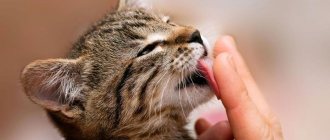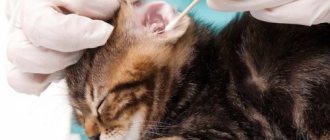The sound of a cat hissing can be downloaded free and safely here in MP3. We have collected sounds of aggressive hissing, angry, threatening, and also a warning when a cat wants to be left alone. A cat sometimes hisses at its fellows, simply because it doesn’t want to play.
Total sounds: 10
Author of the publication: Lenova
The sound of a cat hissing is quite monotonous, even the color of the hissing sound of different domestic cats is very similar. The same cannot be said about meowing. This is where cats show incredible diversity. But the situations in which you can hear the sound of hissing can be very different.
Cats do not always make a hissing sound in a state of extreme anger. In our selection there is a sound when a cat hisses and gets angry while sitting next to a cage with a bird. The bird does not pay attention to her and this literally infuriates the cat. The characters of these cute animals are still the same.
Why do cats hiss?
Lili Chin
Hissing is a warning. As a rule, most cats try to avoid fights and direct confrontations. They use body language, marks, and sounds, including hissing, to establish boundaries and clarify relationships.
The hissing cat warns its opponent that it is better not to mess with it.
Cats hiss when they sense immediate danger or are very frightened of something or someone. For example, cats hiss at each other before a fight, warning that they are ready to defend themselves. The hissing cat is scared, but ready to fight back if necessary.
At the same time, in their minds, anything can be a danger: the appearance of an unfamiliar cat or dog, an examination by a veterinarian, or even a careless gesture or movement of the owner. It happens that cats hiss at strangers, for example your guests. In this case, it is better to ask the guest not to touch the cat.
Animal psychologists suggest that cats learned to hiss by imitating the hissing of snakes, because most animals are afraid of snakes, including those that can threaten the cat.
A characteristic feature of some breeds
For cats of certain breeds, hissing is a mandatory element of communication. This is how they try to convey important information. For example, Abyssinians and Cornish Rex hiss when they want to run and frolic, but there is no such opportunity. These cats are very active and the restriction of their mobility causes dissatisfaction. Cats, owners of fluffy coats made of long hair, will hiss if you want to stroke them after they have spent a long time and concentratedly putting their “outfits” in order. Vulnerable hairless Egyptian cats will definitely react if you touch them with cold hands. There are also breeds for which there is no need for a reason to hiss at all. These are aggressive Siamese and Bengal cats.
Why do cats hiss at kittens?
Cats don't hiss at their kittens. But if you bring a new kitten into your home, the cat may greet him with hissing.
The reason is still the same: for your cat, even this baby is something unfamiliar and potentially dangerous, in case he eats all the food or wins the favor of the owner, so you need to warn the newcomer who is in charge here.
To avoid such hissing, never introduce your cat to another cat or kitten right away. Give them time. Ideally, the new animal should live in a separate room for the first time, so that the cats gradually get used to the smell and presence of each other, and interest will prevail over fear.
Territory defense
If a new person appears in the house, and even more so another animal, the cat will definitely strive to prove its right to the territory. If you get another pet, be prepared to be on guard at first and maybe even break up fights. The cat is sensitive to encroachment on any of its places, its favorite toys and human attention. You need to be patient and give her a little more attention. Pet the cat, show it that you love it, and over time there will be peace in your home.
What to do if your cat hisses
A hiss is a warning that should not be ignored, because if the cat cannot escape, an attack will usually follow.
Therefore, if a cat hisses:
- give her time to calm down;
- give her the opportunity to run and hide (unless you are at the vet's office, of course);
- do not punish or scold her for hissing;
- if it is an unfamiliar cat, let it get used to your smell before picking it up or touching it;
- try to avoid situations that frighten the cat.
If your cat hisses at you every time you pick him up, it could be a sign that something is hurting him.
If you examined your cat and the veterinarian did not find anything that could hurt, it means that your cat does not trust you and is afraid of you. Well, it's worth working on building trust!
Fright
Anything can scare a cat: an unfamiliar environment, a stranger, an incomprehensible smell, a sharp and loud sound. Sometimes fear is associated with unpleasant memories. For example, when visiting a veterinarian, a cat remembered pain and a frightening smell. Finding itself in the same situation after some time and hearing the same aroma, the cat hisses. Try to distract her with something tasty or pet her.
Mimicry in the animal world
In nature, living beings often deceive their enemies. Some stand on their hind legs or raise their fur, or spread their wings, as if increasing their size. Some insects disguise themselves as bees, and one type of beetle even buzzes when threatened. Rattlesnakes produce a rattle sound, and almost all of them hiss. Zoologists believe that the hiss of cats is copied from snakes, since everyone is afraid of these reptiles, including the enemies of cats. All these tricks mean “I’m bigger and stronger, it’s better not to interfere.”
© shutterstock
Hissing as a breed trait
It has been noted that hissing may be a consequence of the breed's temperament. Thus, emotional, easily excitable cats, characterized by a quick and vivid reaction to what is happening, are prone to outbursts of emotions. These are, for example:
- Siamese;
- egyptian Mau,
- Turkish van;
- Abyssinians;
- Cornish Rex;
- orientals.
Living in isolation and lack of regular physical activity does not benefit the character of these cats, making them even more obnoxious and grouchy.
Features of other breeds. Persian and Siberian cats are very jealous of the cleanliness of their “fur coat” and can become angry if you constantly touch them with your hands. In turn, independent British people do not like hugs and cuddles, so they can hiss when treated with familiarity. And sphinxes are prone to sound outpourings and can hiss from an excess of feelings without any negative connotation.
Hissing is one of the communication options
Hissing is not always a sign of aggression and warning. Cats can hiss from fear, stress, or depression. Sometimes with this behavior the animal attracts attention to itself and wants to be reassured. Therefore, in the absence of objective reasons for hissing, you should try to stroke, caress your pet, and talk to it. But, if the animal shows that it wants to be alone, it is better to leave it alone for a while.
Cats can often hiss while sitting near a window or front door. The reason for this is the emergence of a potential competitor on the horizon. In such cases, the hissing may be followed by an attack on the owners or a mark of their own territory. According to experts, this is explained by the so-called switchable aggression.
You should not touch your pet during a meal, as this can provoke food aggression.
That is why it is not recommended to accustom a kitten to hand feeding; at some point the animal may regard human palms as competitors and attack them.
When can a cat hiss for no reason?
Why does a cat hiss not only at a stranger for no reason, but also at you? If your animal's behavior defies any logic, if the animal was examined by a veterinarian and said that it is healthy, then perhaps your cat's hissing lies in the following:
- heredity . Do not forget that each cat has its own character, for which genes are responsible. If the kitten's father or mother had a conflicting and quarrelsome disposition, most likely the kitten will inherit this. Especially if you picked up a street kitten.
- I smelled someone else's scent . This can happen if you were visiting someone with a pet and brought a foreign smell on your clothes or shoes.
- provocative games. A cat may hiss if it doesn't like your games. Cats begin to hiss if you suddenly put your hands in front of her, scaring the cat.
- The cat just doesn't like people. Animals, like some people, feel better alone. They cannot stand it when there are many people in the room, when the cat is given too much attention. Then they begin to defend themselves, using hissing as a warning.
Bad mood
Cats can also be in a bad mood. If she is not in the mood to communicate and is in a bad mood, then it is better not to disturb her. Otherwise, its owner's mood will deteriorate.
Maybe right now she doesn’t want to be stroked or touched, and the owner is trying to show care and love. It is logical that the animal will respond with a hiss, or maybe something more convincing, for example, a wave of its paw.
By the way, it’s quite easy to understand that a cat is in a bad mood. It is enough to pay attention to the expression of her muzzle, the position of her body and ears. If a cat is angry, it is better not to approach it.
Hissing is a warning measure
The hissing of a cat is primarily a warning maneuver; the animal demonstrates that it is better not to touch it and generally stay away. Often this behavior occurs when there is potential danger. Cats are brave animals and thus show that, although they are scared, they are still ready to defend themselves if necessary.
Various factors can act as danger, for example, the appearance of another representative of the animal world in the territory of a furry pet, strangers, loud noises, careless gestures of the owners.
You can assess the condition of a cat by its appearance at the moment of hissing and immediately before it. Even an affectionate pet becomes tense, arches its back, presses its ears, and its pupils constrict, which indicates a surge of adrenaline and a high degree of concentration. And the raised fur gives the cat a frightening, menacing appearance and even increases its size somewhat.
Breed characteristics
The character of a cat largely depends on the breed. For some breeds, hissing is a way of conveying information.
- Siamese cat. Although this is a fairly popular breed of domestic cat, almost all Siamese have a difficult character. If you've ever been scratched by a Siamese cat, you won't forget it for a long time. And if you yourself are the owner of a “Siamese”, then most likely you will constantly walk around with scratches. “Siamese,” among other things, are also cunning and insidious: if they decide that they are offended by you, they may not take revenge immediately, but after a while they may take you by surprise.
Siamese cat
- Bobtail. At first glance, bobtails with tails reminiscent of rabbits look cute and innocent. But they are close relatives of the Siamese, so they have a suspicious and independent character. It is even recommended to keep cats of this breed as guards if for some reason you cannot get a dog.
Bobtail
- Abyssinian breed. Like the Siamese, they tend to take revenge for insults. They can snap even in a harmless situation. Abyssinians need constant attention. Otherwise they run wild.
Abyssinian cat
- Maine Coon. These “muscles” from the cat world can weigh up to 15 kg. They appear to be good-natured and lazy, and sometimes there are recommendations to have them for children. But you should be careful with Maine Coons.
Maine Coon
- British Shorthair. The British look like soft plush toys. But in fact, they are very independent and cannot stand it when people treat them with familiarity - pick them up, pull them. The British are accustomed to royal treatment.
British shorthair breed
- Sphinx. Hairless cat breeds may simply not like the fact that you try to pet them with cold hands.
Sphinx
Psychology and mysticism
Cats are extremely sensitive and to a certain extent mystical animals; they very subtly sense the energy of other people. It is for this reason that if an always calm and friendly pet selectively hisses at a particular person, you should be careful and be careful with him.
According to ancient beliefs, cats can see spirits and astral entities present in the house and react to them with the help of hissing, an aggressive posture and tousled fur. In this way, they try to drive out otherworldly creatures, demonstrating with their terrifying appearance that they are the rightful masters here.
Preparing for an attack
By hissing, the cat indicates that it is ready to attack. If the owner or his guests ignore the cat's body signals, it may attack. This is a warning sign before an attack.
Don't think that cat scratches are nonsense. Sometimes a pet can cause serious health damage.
By the way, it may happen that the cat will simply redirect its aggression towards you. For example, she will see a cat on the next balcony, but she cannot get it. Therefore, she will have to take out her anger on the person or animal that is always nearby.
"Hises like a snake"
Hissing is a very specific sound, eloquently indicating a strong negative reaction. A surge of irritation and negative emotions confirms the entire appearance of the animal:
- open mouth with demonstration of the entire combat set of teeth;
- burning eyes with dilated pupils;
- ears pressed to the head;
- an angry bristling mustache;
- raised wool.
Associated reactions. Depending on the degree of threat and personal temperament, the severity of the defensive reaction is not always the same, so a hissing cat may:
- At the next moment, quickly retreat, fleeing.
- Take a characteristic pose with an arched back and fluffy tail raised up, which means a more serious attitude and an attempt to intimidate the enemy.
- Apply several blows with a clawed paw, while grouping yourself and pressing your stomach to the ground, which symbolizes the intention to fight. The tail twitches nervously or whips from side to side.
Who is guilty. Dissatisfaction, fear and aggression, encrypted in hissing, can be directed both at a specific living object (a rival cat, a dog, a stranger) and “into space”, being initiated by a sudden loud sound or a flashing shadow. Regardless of the source, the cat's expression of displeasure, when further provoked, can develop into an attempt at violent self-defense and end in a harsh aggressive attack.










